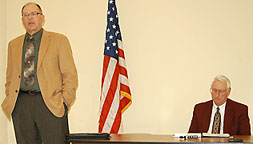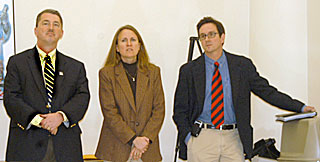
Missouri Department of Natural Resources ombudsman Dave Woolery, (seated) is dwarfed by his boss, Doyle Childers, the MDNR director. A DNR entourage made a stop in Joplin on January 5, 2007 as part of their statewide jaunt.
The meeting held at Joplin City Hall on Friday was delayed awaiting the arrival of Doyle Childers, the Missouri Dept. of Natural Resources director. His whereabouts were made public after Dave Woolery, ombudsman for the director, admitted that Childers was coming from Neosho and a meeting with MoArk officials, a revelation he was hesitant to admit in view of the number of petitioners in the audience fighting expansion of the egg-producing company and the heavy odors it has been producing that are considered a threat to their quality of life.
Woolery did call Neosho "another little problem area." The avoidance of the DNR in scheduling a town meeting there instead of Joplin remains a curiosity, especially in light of Woolery's further comment that the meetings were to "get around and get input from the people."
Wes Franklin, reporter for the Neosho Daily News, in his article, "DNR omits Neosho from public meeting stops" (Jan. 4, 2007) did an excellent job in revealing the snow job that agency spokespersons try to pull when he quoted the DNR's Assistant Director of Communications, Larry Archer, as saying, "We understand, certainly, that Neosho is on everybody's radar right now, but part of it was simply time...The director has squeezed in as many of these town hall type meetings as possible. This time it didn't include Neosho. But he's in Southwest Missouri so often that I'm sure probably next time he'll make a stop in Neosho."
According to Franklin's article, Archer reportedly called the meetings a chance to find out "whatever's on the minds of the county commissioners and others" with whom the DNR speaks "in an open forum type setting to which the public is invited to participate as well." In this case the reference was towards Joplin city and Jasper County officials rather than those from Neosho and Newton County. And although Neosho residents impacted by the conditions in their area came to the meetings to voice their opinions, Newton County commissioners and officials from the city of Neosho with one exception were spared being entered in any debate. Even though the room in Joplin was full of local politicians or their representatives, not one of them openly spoke out.
In response to a question on updating the status of the notices of violation issued to MoArk, Childers said he was "not prepared to offer a statement on this" and "that's why we didn't have a public meeting down there." End of subject.
What Childers preferred to discuss were suggestions by Gov. Matt Blunt to finding answers to "how do you prevent environmental problems from happening in the first place"--prevention in lieu of remediation, or as Childers put it, "compliance assistance over command and control." And with the Environmental Protection Agency looking over the DNR's shoulder, the federal agency becomes somewhat of a fly in the ointment.
Childers seemed to prefer focusing more assistance on the mom and pop operations rather than the CAFOs when he commented that his agency wants people to understand the permitting process. It was not clear whether the "45 per cent not in compliance with their permits" included both groups. In any event, automation of the permitting process was seen as the answer to dealing with the 30,000 permits Childers said the agency handles per year. However, computerization of this process is seen by many as creating more of a gulf between the permit petitioner and the DNR, as in the case of the Crossland project at 32nd St. and McClelland in Joplin that, without a citizen's intervention, saw a hill leveled and trees clear cut without fencing to protect nearby Tin Cup Creek.
Presenting a see-saw argument between the value of local legislation to control environmental problems versus state legislation and state agency control, especially in dealing with the establishment of CAFOs, Childers chastised locals for voting against the concept of county planning and zoning on one hand, yet he was adamantly opposed to individual county health department ordinances regulating CAFOs on the other, saying there would be "114 different rules"... rather than "something more uniform."
Water crises
The drop in water tables in several areas of Missouri is considered one of the more critical issues faced by the state, Childers admitted. He said he was amazed to find out that as early as 1938 a WPA project warned of a future crisis. This is the basis for what we are studying, Childers said calling attention to a state review commission's report just delivered to the governor and the need to designate 80 new monitoring wells.
Part of the study involves figuring out how to keep water run-off from ending up in the Gulf. Childers' solution calls for the need for some impoundments at the head waters. How this will effect the water table levels of neighboring states does not seem to be an issue.
While he dismissed the fear that establishment of high water usage ethanol plants would further drain the water supply, Childers said that the pulling out of water from the Missouri and Mississippi rivers by North and South Dakota is having a huge impact on our water supply.
"We have to start to argue over the riparian rights issue," Childers said. He called the question of "whose water is this" the biggest issue on the horizon but he defined that "horizon" as "within the next 10-20 years." He also said it would take an "immense change in mentality" and the passage of a Constitutional amendment by state voters to challenge riparian rights laws. Before this happens, Childers didn't discount the possibility of water rationing, a legal mandate that can be made for health reasons.

Missouri Department of Natural Resources personnel accompany Director Childers around the state. They are, L-R, Jim Macy in charge of outreach, Leanne Tippett-Mosby, handling environmental quality, and Kurt Schaefer, dealing with legal issues and the Jeff to Childer's Mutt. At one point in the discussion Schaefer reminded the audience that since agriculture was the biggest industry in the state of Missouri...similar to other indutries that are necessary and vital to the economy, we can't have counties dictating odor regulations. We'd lose the agriculture.
Litter, litter everywhere
Bill Miller, a Newton County resident who has been working with the county health department testing streams for contamination, suggested to Childers that his department stop issuing permits because mandated litter removal from his watershed is unfairly being supported by taxpayers. Childers couldn't deny the use of 319 money for this purpose but shifted the subject to how to keep litter from coming into the state from neighboring Arkansas, a situation, he said, "makes us nervous."
Childers called litter a "product [of] great value...get them [litter pellets?] from an area where they're overloaded to an area where they're needed." In terms of dealing with the commodity that he said under interstate commerce can't be regulated, he suggested the possibility one day of converting litter to home heating fuel and to encourage Arkansas to keep their litter at home.
Although during Childers' brief interview on camera for KSN-TV he stressed that his agency would not ignore what's dangerous, he called for ameliorating any problems by getting a "handle on what the technology is they (presumably referring to MoArk and RES) are dealing with...if it really is making a difference...and how to make the transition to this new technology"--all this before dealing with at what point the DNR should become unfriendly. In the case of MoArk's dry litter technology in their new houses critic Mark Adams' argument that this "European technology" is now passe has fallen on deaf ears.
Childers is the pawn of political pressure preserving business interests, as Rosemarie Karnes, the newest council member elected in Neosho noted. "They think in terms of economic development rather than in protecting our resources." she said. Karnes also was the only member present taking a pro active stand to protect the environment.
In terms of controlling environmental issues, Childers said "the best way is to have a dictator to say, 'you do this, you do that,' but we have property rights." Childers later said "dictator" may have not been the right word and thought, maybe, "czar" was better.
Lee Van Otterloo, one of the petitioners against MoArk expansion, and whose frustrations surfaced easily, countered with, "What the hell is he?"
Look for article on Carthage meeting coming soon






Comments